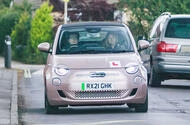The wait for a driving test in the UK has become a significant hurdle for many learners, with some facing delays of over six months. The Driver and Vehicle Standards Agency (DVSA) is stepping in to tackle this issue by increasing test capacity by 10,000 slots each month. This move aims to alleviate the backlog that has built up, particularly since the disruptions caused by the COVID-19 pandemic.
### Why Are Wait Times So Long?
Currently, 57% of test centers are reporting wait times exceeding six months. This situation has worsened since early 2024, with the national average wait climbing from three and a half months to five months. The backlog stems from a combination of factors, including the pent-up demand from the pandemic when tests were frequently postponed or canceled. As Lorna Lee from AA Driving School points out, the gradual return to normalcy has not been matched by an increase in available test slots, leaving many learners in limbo.
### What Is the DVSA Doing to Help?
In response to the growing crisis, the DVSA is not only increasing the number of available test slots but also doubling its efforts to train new driving examiners. They’re reintroducing overtime incentives for existing staff to boost the number of tests conducted. Transport Secretary Heidi Alexander has emphasized the urgency of this issue, stating that immediate actions will be taken to reduce waiting times significantly.
However, while these measures are a step in the right direction, they may not address the root cause of the backlog. Lee argues that the fundamental issue is a lack of supply to meet demand. When the DVSA temporarily increased test capacity by 150,000 slots last year, it led to a noticeable decrease in waiting times, but the effects were not sustained, and the backlog quickly grew again.
### The Impact on Learners
The long wait times are not just an inconvenience; they have real consequences for learners. Many are investing significant amounts of money into lessons and preparation, only to face extended delays in securing a test date. For some, like Ricky Tang, an independent driving instructor, the situation is dire. He notes that learners who need to pass quickly for job-related reasons are particularly affected, with some waiting up to six months, which can hinder their career prospects.
Moreover, the pressure to pass on the first attempt is mounting. With the knowledge that a failed test could lead to another lengthy wait, many learners feel stressed and anxious. This pressure can affect their performance during the test, creating a vicious cycle of anxiety and delay.
### Innovative Solutions to the Backlog
Some instructors are calling for creative solutions to improve the situation. Tang suggests an airline-style standby system, where learners could fill open slots if others fail to show up. This could help reduce the backlog by ensuring that available slots are utilized efficiently.
### The Role of Technology in Booking Tests
Another layer to this issue is the emergence of automated services that are hoovering up test slots. Many of these services use bots to quickly book tests, often reselling them at inflated prices. While the DVSA has taken steps to combat this practice by revising booking terms and closing accounts that abuse the system, the problem persists. Tang highlights that despite these efforts, third-party apps continue to advertise available dates, indicating that the issue is far from resolved.
### Real Stories from Learners
The frustrations of the testing process are palpable. Heman Leung, who moved to the UK from Hong Kong, experienced the stress of long wait times firsthand. After several failed attempts and a six-month wait for his test, he finally passed on his fourth try. The experience transformed his life, allowing him to drive his children to better schools and feel more integrated into his community. His story underscores the emotional weight that the driving test process carries for many learners.
### Moving Forward
The DVSA’s commitment to increasing capacity is a positive step, but it’s clear that a multifaceted approach is needed to truly resolve the backlog. Addressing the root causes, improving the booking process, and considering innovative solutions will be crucial in ensuring that learners can access the driving tests they need without undue delay.
The big takeaway? Tackling the driving test backlog isn’t just about increasing slots—it’s about smarter adjustments across the board. If you’re waiting for your test, consider reaching out to your instructor for tips on managing the wait or exploring alternative driving opportunities in the meantime. Every small step can make a difference in this challenging landscape.

